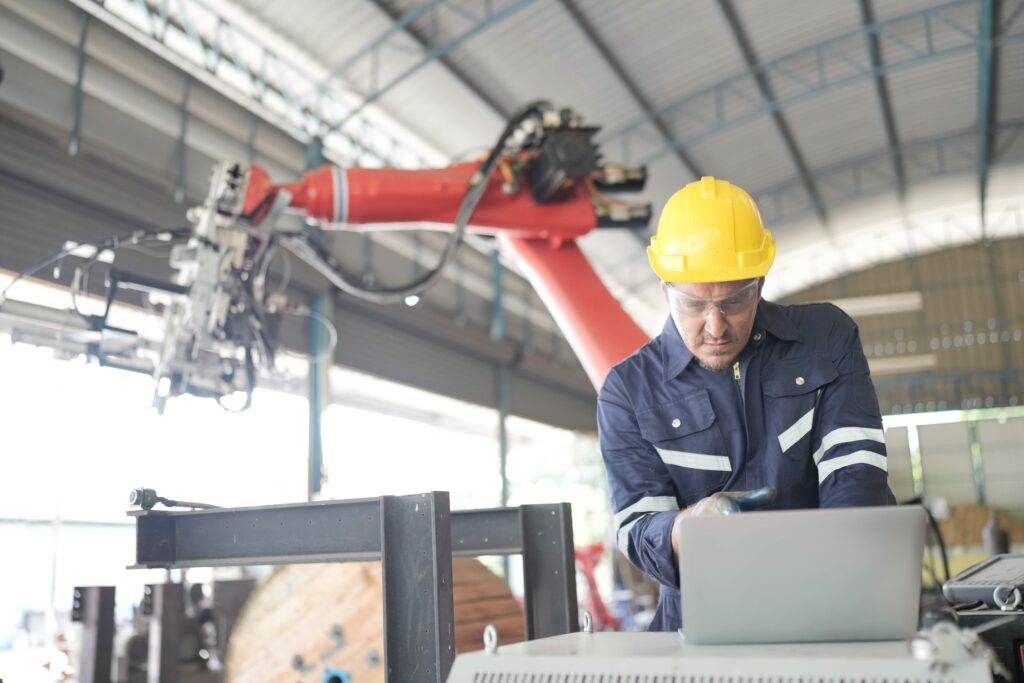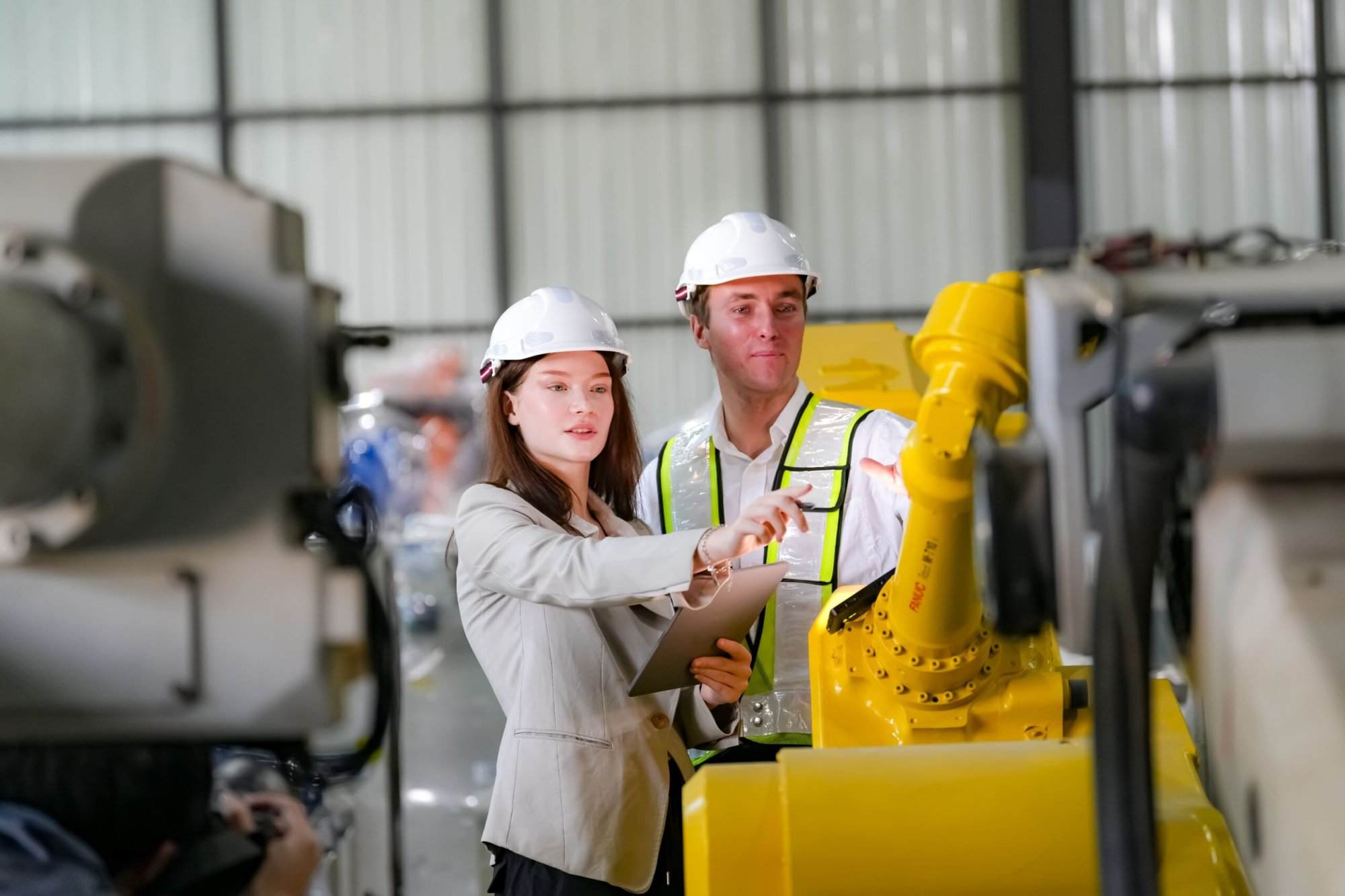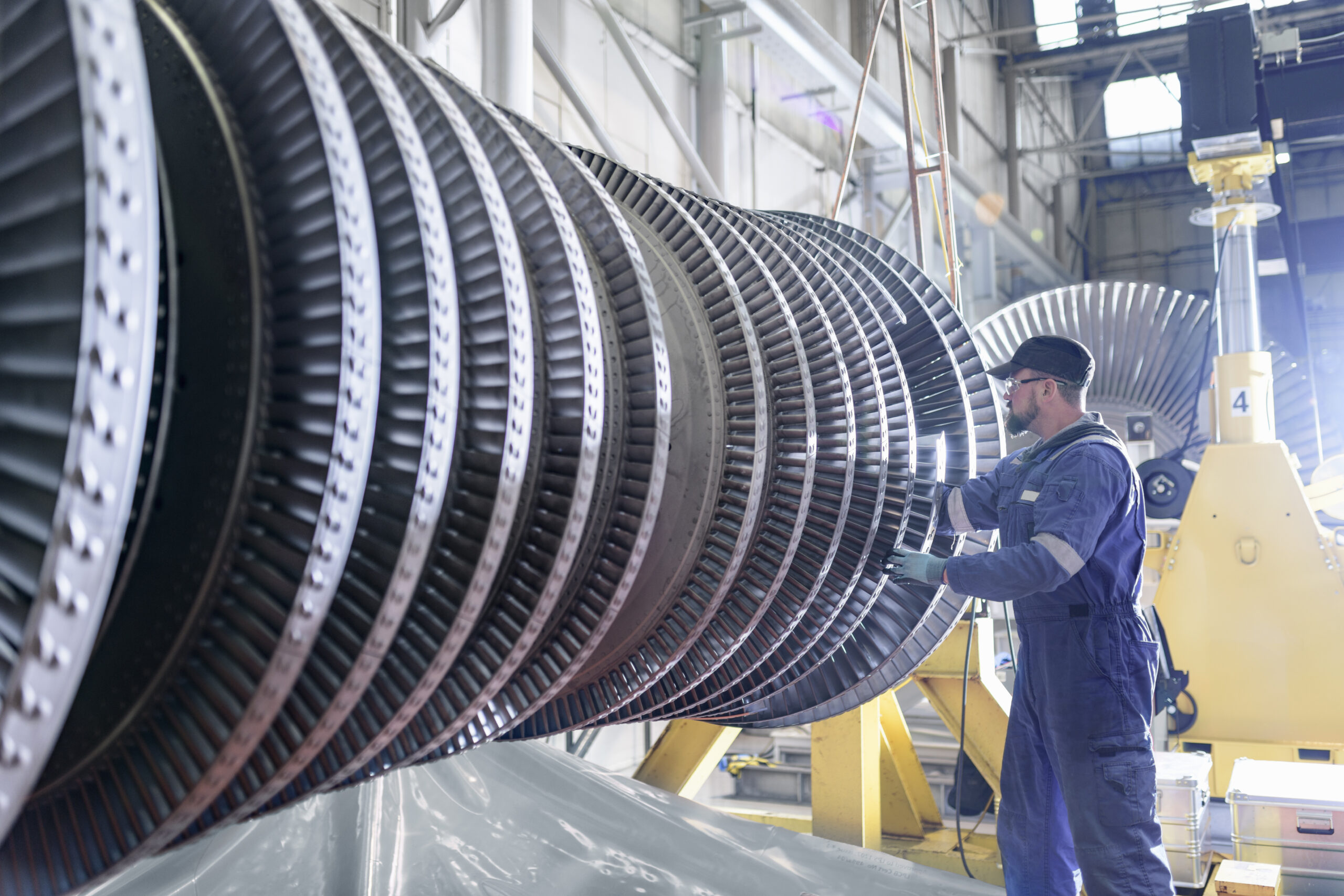With industrial competition intensifying and consumer demands growing more sophisticated, businesses confront challenges that can impede their growth and operational efficiency. These challenges include ramping up production output, improving product quality, ensuring workplace safety, and diminishing operational costs and environmental impact. Smart industrial automation systems, through their integration with advanced technologies such as AI, IoT, and real-time data analytics, offer a compelling solution to these obstacles.
Smart automation surpasses traditional automation by performing repetitive tasks and supplying intelligent insights that foster proactive decision-making and predictive maintenance. These systems can dynamically fine-tune processes to adapt to changes in the production environment or supply chain disruptions, guaranteeing continuous peak performance.
The transition to smart industrial automation promises transformative potential for industries – they can now handle everything from slight operational tweaks to comprehensive strategic overhauls with finesse and precision. AP4 Group, a leader in maintaining and optimizing industrial gas and steam turbines, empowers businesses by integrating advanced automation solutions. We seamlessly blend programmable logic controllers, SCADA systems, and robotics to transform manufacturing processes and drive unparalleled productivity gains.
This discussion explores how smart industrial automation systems can redefine traditional production lines and operations management. We will look at the specific challenges industries face today and explain how smart automation solutions can address each of these issues, ultimately boosting productivity and sustainability.

Elevate Your Manufacturing Process With Advanced Industrial Automation Systems
Industrial automation is revolutionizing modern manufacturing by streamlining production processes and enhancing precision. At AP4 Group, we leverage our expertise in maintenance and reliability for industrial gas and steam turbines to deliver top-tier automation solutions. We incorporate programmable logic controllers (PLC), SCADA systems, and advanced robotics to optimize every aspect of your production line.
Not only does automation eliminate unnecessary downtime, but it also ensures high efficiency, real-time data monitoring, and significant cost reductions. Our strategic OEM alliances and global presence allow us to rapidly deploy parts and services, ensuring your operations are always running smoothly. With a commitment to flexibility and innovation, AP4 Group is prepared to transform your manufacturing process, bringing newfound levels of productivity and reliability.
Here are some other ways smart automation systems can help overcome some of the industry’s biggest obstacles.
1. Enhancing Efficiency And Productivity
One of the most significant challenges in the manufacturing industry is improving efficiency and productivity without sacrificing quality. Smart automation systems are adept at optimizing production processes. They allow for continuous operation without the limitations of human fatigue, reducing downtime and increasing output. Robotics and conveyor systems streamline material handling, and AI-driven machinery can adapt to different tasks on the fly, reducing the need for manual reconfiguration.
Key benefits:
- 24/7 operational capability: Robots don’t need to rest, allowing for round-the-clock production
- Consistent quality: Automated systems maintain the same level of high-quality output without human error
- Adaptive production lines: AI enables machines to adjust operations based on real-time data
2. Reducing Operating Costs
Operating costs can be a heavy burden for many businesses. Smart automation systems minimize these costs in several ways. The precision of automated technology reduces the amount of waste and rework necessary, and the improved efficiency translates into lower energy usage. Furthermore, labor costs can be significantly reduced if fewer manual interventions are needed.
Key benefits:
- Less waste: Precise operations minimize material wastage
- Energy efficiency: Smarter planning and operation lead to reduced energy consumption
- Lower labor costs: Automation can offset the need for a large workforce
3. Improving Workers Safety
Industrial workplaces can be hazardous, making safety a perpetual concern. Smart automation systems can execute dangerous tasks, thereby reducing human workers’ exposure to harmful conditions. Sensors and safety-focused AI algorithms can also detect potential hazards and initiate corrective measures, further enhancing the working environment.
Key benefits:
- Less human exposure to danger: Machines handle tasks that involve toxic substances, extreme temperatures, or heavy lifting
- Risk detection: Smart sensors can anticipate and respond to hazardous conditions before they become incidents
4. Supply Chain Optimization
Supply chain interruptions can cause severe disruptions in production. Smart automation systems provide transparent, real-time insights into every aspect of the supply chain, which helps companies anticipate and adjust to disruptions. Predictive analytics can forecast demand more accurately, ensuring optimal inventory levels without overproduction.
Key benefits:
- Real-time tracking: Automated systems monitor every step of the supply chain
- Predictive insights: Data analytics enable proactive inventory and supply chain management
- Enhanced coordination: Improved communication and synchronization between different parts of the supply chain
5. Addressing Customization Demand
The modern consumer market increasingly demands customized products, a challenge for traditional manufacturing setups. However, with smart automation, production lines can switch between tasks quickly to accommodate small batch orders without sacrificing efficiency. This adaptability allows manufacturers to offer a range of products that can be tailored to customer specifications.
Key benefits:
- Flexible production: Automated systems adapt quickly to new designs and custom orders
- Cost-effective customization: Economies of scale can still be achieved with high variability in production
Smart industrial automation systems are the industry’s answer to a fast-evolving market that requires resilience, flexibility, and efficiency. By investing in these technologies, businesses can solve their biggest challenges and position themselves competitively for the future.
Exploring Different Types of Industrial Automation
Industrial automation has quickly become a backbone of modern industries, propelling them toward futuristic operational efficiencies and capabilities. While all industrial automation might serve the common purpose of enhancing productivity and reducing costs, the field comprises various types of automation systems, each suited for different applications.
Fixed automation, ideal for high-volume production lines, delivers unmatched consistency and speed. Flexible automation provides versatility for operations requiring adaptable solutions, enabling manufacturers to switch between tasks swiftly without significant downtime. Programmable automation merges the best of both worlds, offering precision through programmable logic controllers (PLC) that can be reconfigured as needed.
Here’s a closer look at some of the main types of industrial automation:
1. Fixed or Hard Automation
This type of automation is characterized by using specialized equipment to automate a fixed sequence of processing or assembly operations. It’s ideal for mass production with low product variability, and while it offers high production rates, it lacks flexibility.
Applications:
- Automotive assembly lines
- Glass and bottle manufacturing
- Food packaging
2. Programmable Automation
Programmable automation is well-suited for batch production, where the sequence of operations can be changed through programming. This flexibility allows for producing different products in different batches.
Applications:
- CNC machining
- Robot-controlled welding
- Automated paint shops
3. Flexible or Soft Automation
Flexible automation combines high production rates with flexibility. Designed for medium to high variety and medium to low volume production, these systems can be reprogrammed quickly to handle different tasks.
Applications:
- 3D printing
- Pick-and-place robots
- Automated guided vehicles (AGVs) for material handling
4. Integrated Automation
This represents the pinnacle of industrial automation, where all aspects of manufacturing, including production, material handling, and quality control, are integrated into a seamless system. Integrated automation relies heavily on digital communication technologies like IoT and Industrial Ethernet.
Applications:
- Smart factories
- Fully automated warehouses
- Lights-out manufacturing
5. Cyber-Physical Systems (CPS)
As a key component of Industry 4.0, CPS connects physical processes with computing and communication networks, enabling self-organization and real-time adaptability in manufacturing systems.
Applications:
- Smart grid energy networks
- Predictive maintenance systems
- Intelligent supply chain solutions
The decision about which type of industrial automation a facility should implement depends on several factors: the nature of the task, production volume, product variability, investment capacity, and the proven potential for return on investment.
AP4 Group’s expertise ensures seamless integration of these systems, allowing businesses to capitalize on advanced technology while maintaining reliability. By leveraging our global presence and strategic OEM alliances, we bring cutting-edge automation systems to your factory floor, significantly boosting efficiency and productivity. With AP4’s tailored automation solutions, your manufacturing process becomes a powerhouse of innovation and precision, ready to tackle any challenge.
Unveiling The Advantages Of Industrial Automation
Industrial automation redefines efficiency and productivity on the factory floor. Integrating automation systems into your manufacturing process produces remarkable productivity and real-time data monitoring uptick. Such systems drastically reduce the need for manual labor, minimizing human error and production downtime. The result? Significant cost savings and an unparalleled boost in operational efficiency.
AP4 Group’s automation solutions, backed by a global network and strategic OEM alliances, offer a perfect blend of reliability and innovation. These systems streamline operations and provide adaptable, scalable solutions tailored to your unique production needs. The advantages are clear: reduced waste, improved quality, enhanced flexibility, and precise control over every aspect of the manufacturing process.
Our expertise lies in swiftly and effectively delivering these high-value benefits, ensuring your business stays ahead in a competitive landscape. Dive deeper with us to understand the components that empower these transformative systems.
Key Components of an Industrial Automation System
The backbone of any successful industrial automation system lies in its key components. At the heart are programmable logic controllers (PLCs), which ensure precise control and seamless operation of complex machinery. Sensors and actuators provide real-time data collection and response, enabling the system to monitor and control various industrial processes with unparalleled accuracy.
SCADA (Supervisory Control and Data Acquisition) systems offer a comprehensive overview and control of industrial operations, facilitating informed decision-making and enhancing productivity. Robot systems and automated devices perform repetitive tasks with a level of precision and consistency that human operators simply can’t match.
Here’s a brief overview of these essential elements:
1. Controllers
Controllers, such as Programmable Logic Controllers (PLCs) or Programmable Automation Controllers (PACs), are the brains of the automation system. They receive data from input devices, process the information according to pre-defined instructions, and output commands to machinery and actuators.
2. Sensors and Actuators
Sensors gather data from the environment, such as temperature, pressure, or proximity, allowing the system to monitor and respond to changes in real time. Actuators translate the controller’s commands into physical movement or action, such as opening a valve or starting a motor.
3. Human-machine interface (HMI)
HMIs are user-friendly interfaces that allow human operators to interact with the automation system, monitor machine status, input changes, and visualize data through graphical screens.
4. Industrial Robotics
Robots are integral to modern automation systems, capable of performing complex assembly, handling, and packaging tasks with high precision and speed.
5. Communication Networks
Robust communication networks are crucial for the seamless integration of various components. Industrial protocols like Ethernet, Modbus, or Fieldbus ensure that data flows efficiently between devices and controllers.
6. Software and Data Analytics
Software solutions, including SCADA (Supervisory Control and Data Acquisition) systems, manage, monitor, and analyze operations. Data analytics tools leverage the data generated by these systems to optimize performance and predict potential faults.
7. Machine Vision
Machine vision systems use cameras and image processing software to perform quality control, guide robots, or handle parts that cannot be easily positioned mechanically. Together, these components create a cohesive and effective automation system capable of withstanding the demands of modern industrial environments and paving the way for digital manufacturing and Industry 4.0.
AP4 Group integrates these cutting-edge components, ensuring your automation is robust and reliable. By deploying advanced tools and leveraging OEM alliances, we enhance your operational capacity and streamline your production line. Ready to dive deeper into how these components revolutionize industry-specific applications?

Understanding Programmable Automation Systems
Programmable automation systems stand at the forefront of industrial innovation, offering unmatched flexibility and control. By employing programmable controllers, such as PLCs, these systems can be tailored to execute a wide array of complex tasks precisely. This adaptability makes programmable automation an indispensable tool for industries that demand high levels of customization and efficiency.
Manufacturers can enjoy enhanced productivity and seamless operations thanks to AP4 Group’s expertise in integrating these programmable systems. Our global network and strategic alliances enable us to deliver robust, reliable automation solutions tailored to your specific needs. With the capability to reconfigure as production requirements evolve, programmable automation systems ensure your manufacturing process remains agile and competitive.
Industrial automation is evolving rapidly, driven by emerging technologies and industry demands. Integrating smart devices and the Internet of Things (IoT) into programmable automation systems transforms manufacturers’ operations. These advancements enable real-time data collection and analysis, facilitating proactive maintenance and informed decision-making.
AP4 Group remains at the cutting edge of these technological advancements, offering scalable automation solutions customized to your unique production needs. Our strategic OEM alliances and global presence empower us to deploy innovative automation tools swiftly and efficiently, ensuring your operations stay competitive.
As automation technologies advance, businesses must align their strategies with these innovations to unlock new levels of productivity and efficiency. AP4 Group is your partner in navigating this transformative landscape, offering the latest information solutions and adaptable strategies.
How An Industrial Automation System Can Transform Your Production Line
Industrial automation systems are revolutionizing production lines across diverse industries. By implementing advanced automation solutions, manufacturers can achieve unprecedented levels of precision, speed, and efficiency. Robotics and automated devices reduce manual labor, minimize human error, and ensure consistent product quality.
AP4 Group specializes in integrating these cutting-edge technologies into your manufacturing process, enhancing overall productivity. Our global presence and strategic OEM alliances allow us to offer rapid deployment and reliable parts and services, minimizing downtime and avoiding costly OEM parts. With automation, your production line becomes a seamless, efficient powerhouse capable of adapting to varying demands.
Automation systems can be reprogrammed and adjusted to accommodate production changes and new products, allowing for easier operation scaling. Automating dangerous tasks minimizes the risk of injuries, creating a safer workplace environment. Streamlined operations, coupled with the ability to adapt to market demands quickly, position companies favorably against competitors. Embracing industrial automation is not just about enhancing efficiency; it’s a strategic move that can redefine your production capabilities and future-proof your business in a rapidly evolving industrial landscape.
Our tailored automation solutions have already transformed operations in sectors ranging from food and beverage to heavy manufacturing, significantly improving quality and flexibility. Ready to witness firsthand how these innovative systems can elevate your production process? Stick around as we delve into client success stories and detailed case studies showcasing industrial automation’s tangible benefits.




